How Long Does a Misdemeanor Stay On Your Record?
In most states, a misdemeanor will stay on your record for at least 10 years but it will usually be on the record forever.
 Written by Background Check Repair
Written by Background Check Repair
Criminal Records | April 29, 2024
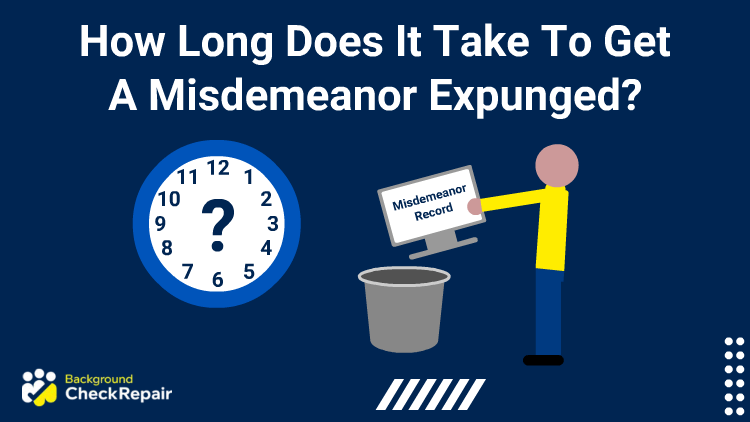
Table of Contents
Individuals looking to clean up their criminal record often ask, how long does it take to get a misdemeanor expunged?
The expungement process varies from state to state and there are a number factors to consider when trying to determine a timeline of expunging a misdemeanor. Generally, once the proper paperwork has been filed it will usually take less than 90 days for the expungement to be granted or denied.
However, there are certain stipulations that need to be considered before you can get an accurate estimate of how long does it take to get a misdemeanor expunged.
This complete guide explains the process and factors that impact the time.
One of the most common questions individuals have about cleaning their records is, how long does it take to get a misdemeanor expunged? The process will vary in length but in general, individuals should expect the entire process to take less than 90 days from when the expungement petition was first submitted to the courts.
The main reason for this process taking as long as it does is simply due to the processing time of the paperwork and the schedule of the courts. As mentioned, the expungement process involves submitting the proper paperwork, then these forms will need to be processed and reviewed, then a hearing date at the courthouse regarding the expungement will be set.
The processing of the paperwork alone will likely take several weeks depending on the court, after this it will take weeks or months before the court date that was set actually arrives. Luckily, in most cases, the hearing will mark the final day of the process, regardless of if the expungement is granted or denied.
Almost anything related to the legal process can be extremely intimidating and the expungement process is no different. Many people will be wondering how to expunge a misdemeanor and may think that they will need a lawyer to do so. Fortunately, this is not true and many states have streamlined the expungement process to make it easier for individuals to begin the process without the help of a lawyer.
The process is different in each state but most states will now offer a form that individuals can fill out and submit to the court to get the process started, such as this one from Alabama.1
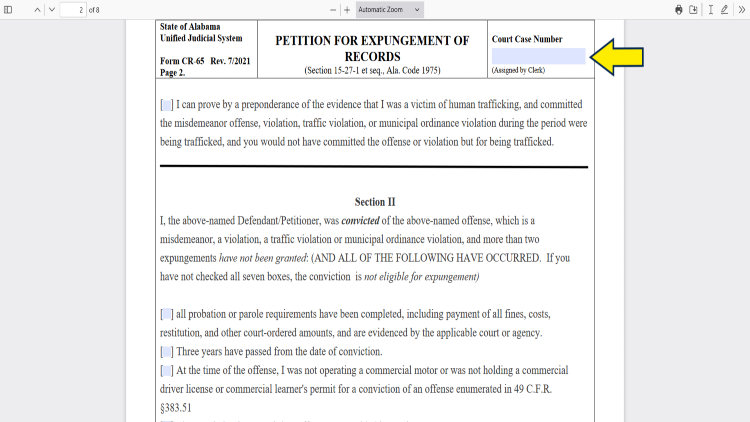
Alabama, like most states, provide clear outlines about how to file for an expungement and clear a criminal record, and it usually involves a specific form to be filed.
Contacting a lawyer during this phase is highly advised as the attorney will be able to explain to the individual the way the process works in that state as well as help the individual understand their chances of getting the charges expunged.
It’s important to keep in mind that the expungement process is not automatic. Even if the individual is trying to get a crime expunged that is normally eligible for expungement there are tons of factors that are considered.
Even if everything is in order the individual must still plead their case in front of a judge that will be able to make the final decision as to whether or not to grant an expungement.
How much does it cost to get a misdemeanor expunged? Most people will find the price to be surprisingly low. However, individuals should keep in mind that expungement is not guaranteed, and individuals can not simply pay a fee to have the crime removed from their records by the courts.
The process will involve a judge examining the facts of the crime and considering other information such as the individual’s behavior since the crime, whether or not there were any issues with the terms of their probation and if they have any other crimes on their record.
The only fee associated with expungement is the filing fee itself. When documents are submitted to the courts, a filing fee is often charged by the courts. However, not all courts will charge filing fees for certain documents and it may be possible to file for expungement for free. Even if there is a cost associated with the filing it is usually less than $150.
When it comes to how long a misdemeanor stays on your personal record there are two main factors to consider: Where the crime was charged and what the crime was.
Where the charges were filed will play the biggest role in determining how long any crime will remain on an individual’s record. Currently, the FCRA2 is the only set of federal laws pertaining to background check information. Per the FCRA, there is no limit on how far back a criminal background check can go, so a misdemeanor or any crime has a fairly good chance of remaining on the individual’s record forever unless it is sealed or expunged.
However, many states have adopted their own background check laws such as the 7-year rule. States that follow the 7-year rule will not allow background check agencies to report criminal history information to employers if the charges were filed more than 7-10 years ago based on the salary of the position the individual is applying for.
In these states, once the crime is old enough it will no longer be viewable by the public and instead will be restricted to official agencies.
Keep in mind that there are only a handful of states that follow this rule and most will allow criminal history information to remain on the individual’s record forever.
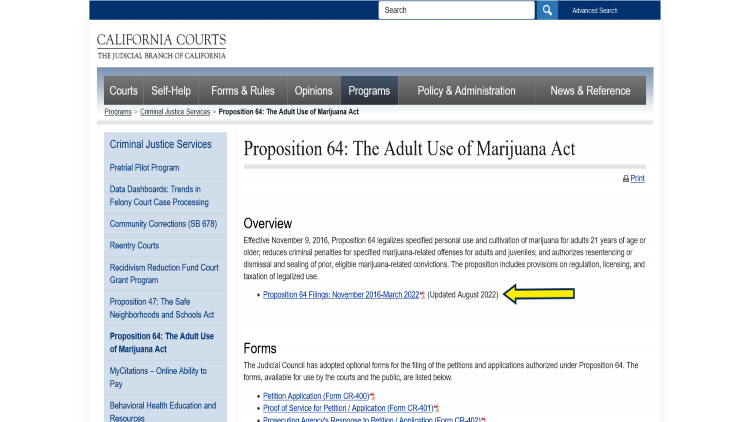
In many states, like California, recent legislation changes have allowed previous marijuana offenders to have their records cleared quickly.
Even in states that do not follow the 7-year rule, individuals may be able to get a record sealed, expunged, or even automatically sealed for certain crimes. More and more states are making the path to expungement much easier if the individual has been convicted of specific crimes. For example, California’s prop 643 allows individuals with various marijuana-related convictions to have their records sealed after just a few years.
After being convicted of a misdemeanor, the big question on many people’s minds will be: how does a misdemeanor affect you? By far the biggest way a misdemeanor will affect an individual’s life is anything involving a background check. For most people, this will mean pre-employment background checks and background checks for tenants.
Any criminal history information will be considered a red flag on either of these checks but in the case of most misdemeanors, it should not have a huge impact. Individuals should be prepared to answer any questions about their criminal record in order to increase their chances of passing a background check.
These potential long-term impacts are one of the reasons that so many people are asking: How long does it take to get a misdemeanor expunged? The sooner your criminal record is cleared the better it is for employment and rental applications.
Individuals wondering, how to know if I have a misdemeanor on my record, can easily find out by performing a background check on themselves.
The fastest and easiest way to run a full background check on yourself is to use the search bar at the top of this page to perform free public records search using your first and last name.
There is also the option to hire a private background check service to perform the check on you as well. This will often require the purchase of a monthly subscription, however, there are several services that offer free trial periods that individuals can take advantage of.
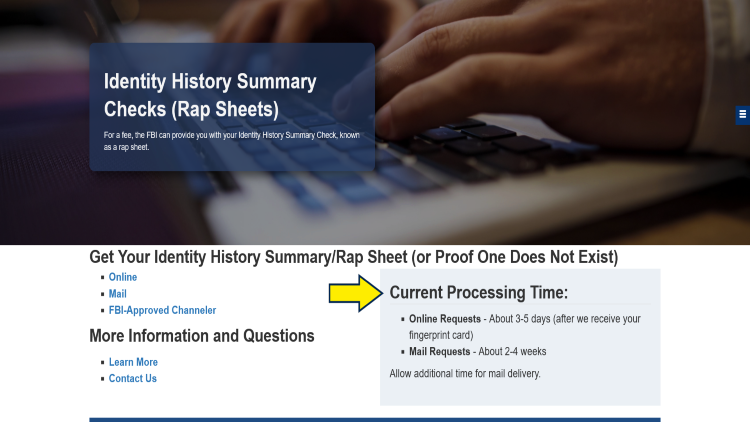
The FBI’s Identify History Summary check can show misdemeanors from various states and can be used to start the process of clearing your criminal record.
Finally, individuals who want the most comprehensive check possible should run a federal background check on themselves.
This can be done by completing the FBI identity history summary check4 which is a fingerprint-based check. Keep in mind this will likely be the most expensive option and will also take up to two weeks to complete.
Many individuals are concerned about finding a job after getting convicted and will want to know, if is it possible to pass a background check with a misdemeanor. Although there is no guarantee that the check will be passed, most companies are more concerned with felony charges than misdemeanors.
Of course, serious misdemeanors such as violent crimes will be seen as a major red flag, most misdemeanors will only require an explanation for the employer to overlook it.
When it comes to will a misdemeanor impacts employment, the answer is fairly circumstantial. All employers have their own policies when it comes to hiring individuals with criminal records.
Regardless of the company policy, having a misdemeanor on your record will affect employment but there is a good chance that the effects will be fairly minimal.
Will a pending misdemeanor appear on a background check is another common question that many people have.
The vast majority of background checks will uncover any and all criminal history information. This includes arrests, charges, and convictions. As long as the paperwork of any kind has been filed with the courts, the information will appear on a background check.
Individuals with dropped charges will want to know, can you pass a background check with a dismissed misdemeanor? It can be hard to say for certain but most employers are most concerned with felony convictions, or convictions in general.
Charges that have been dropped or if the individual was acquitted in court, then the impact will be fairly minimal when it comes to the background check.
There is a lot of misinformation regarding the way misdemeanors affect background checks leading many people to ask, do misdemeanors ever disappear on your record?
In most situations, a misdemeanor conviction will remain on the individual’s criminal record forever. There are a handful of states that will automatically seal this information after a certain amount of time has passed, usually 7-10 years, but very few states have these laws.
The only other way to get a misdemeanor to go away is by having the record sealed or expunged. Keep in mind that official agencies will still likely be able to view this information, but most background checks will not be able to view these records.
What felonies are eligible for expungement? The answer depends on the state where the charges were filed. Each state has different laws regarding expungement processes and what crimes are eligible for expungement.
Generally, the less serious the crime the more likely that it will be eligible for expungement. Individuals should also keep in mind that some states make expungement extremely difficult or do not offer it at all. Because of this, it usually makes more sense to try and get the records sealed instead of expunged.
Many individuals wonder, do misdemeanors go away from your record when you turn 18 or do felonies go away from your record at 18? The idea that your criminal record is cleared when you turn 18 is a common misconception. In most states, an individual’s juvenile criminal record will remain with them unless they have the records sealed.
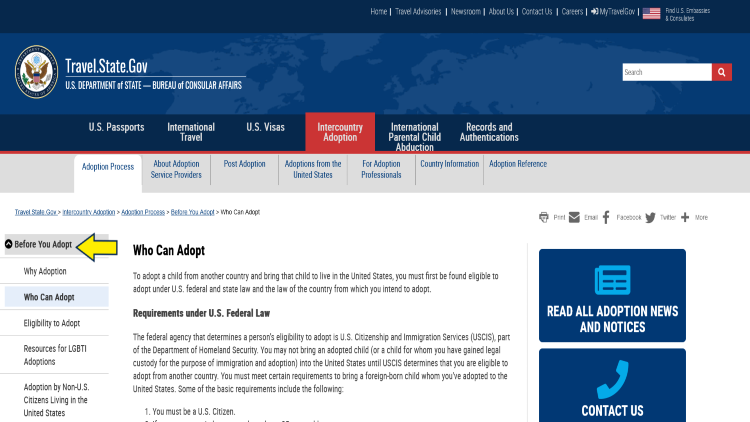
Misdemeanor expungement is crucial for individuals who want to adopt.
Luckily, getting juvenile records sealed is far easier than getting adult criminal charges sealed and most states will offer a much clearer and quicker path to getting records sealed when it comes to crimes committed while the individual was a minor.
You can, however, run a search for juvenile criminal records if you are concerned about what appears on a criminal record.
After seeing the estimates of lawyer fees, many people will want to know how to expunge a misdemeanor without a lawyer. Luckily, this is easier than ever thanks to many states creating programs and processes to help individuals clean up their records.
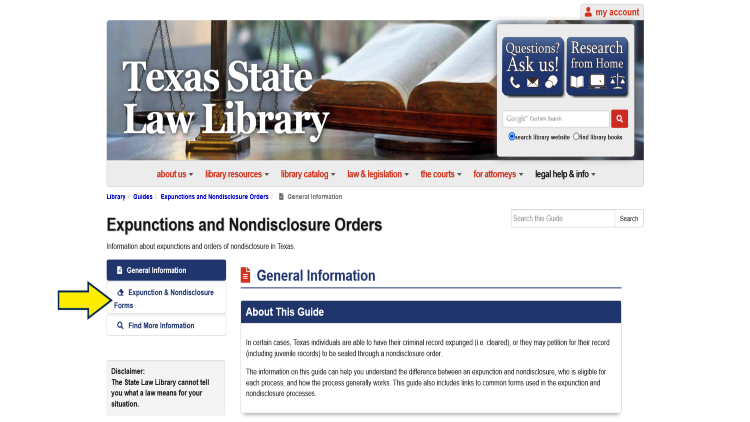
Each state offers specific a detailed information about the process involved in expunging a criminal record.
The process is different in every state but individuals should contact their local court to see if there is an expungement form available.
A lawyer can help guide individuals through the process but filing the expungement petition without one is entirely possible.
After a conviction, many individuals will be wondering: Will a misdemeanor ruin my life? And they are concerned about how long a felony stays on your record. Generally, misdemeanors are seen as fairly unserious. Although there are exceptions such as violent crimes, most employers and landlords will not see a misdemeanor on someone’s records as a major cause for concern. Compared to a felony the long-term effects of a misdemeanor are fairly mild.
When it comes to what can a misdemeanor prevent you from doing, the list is fairly short. Most notably it will prevent individuals from getting hired for certain jobs as well as make things like adopting5 somewhat more difficult.
Plenty of people will be wondering if there are specific misdemeanors that prevent employment. There are very few misdemeanors that are especially likely to result in disqualification from a job as most can be overlooked in the right circumstances. The misdemeanors that are unlikely to be overlooked include the following:
Does a misdemeanor go away is a fairly common question. A misdemeanor will stay on your record forever in most states unless it is sealed or expunged. Some states will remove any criminal history from your record after a period of 7-10 years but only a handful of states have laws that require this.
Although there is a lot to consider before the paperwork has been officially filed when it comes to how long does it take to get a misdemeanor expunged? The process usually takes less than 3 months once the proper paperwork has been filed to get a record expunged.
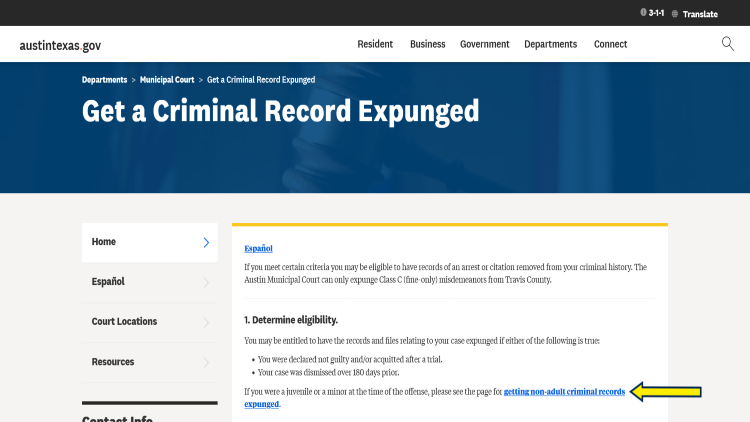
The process for getting a criminal record expunged in Texas starts with determining the eligibility of the record to be removed.
The legal process can be extremely intimidating especially when it comes to getting your criminal record cleaned up. Individuals who wonder: how long does it take to get a misdemeanor expunged should know the process takes about 90 days or less once the paperwork has been filed.
In most states, a misdemeanor will stay on your record for at least 10 years but it will usually be on the record forever.
Misdemeanors will be seen as red flags to employers. Many will be willing to overlook low-level charges if the individual shows a desire to move forward and remorse for the crime.
Most misdemeanors will have no effect on a nursing license however any conviction needs to be reported to the nursing board for review.
A crime is dismissed if there is not enough evidence to convict the individual, there will be no trial and the individual’s criminal record will remain clean. Expungement refers to the process of getting a conviction removed from an individual’s record.
A charged misdemeanor is a formal accusation of the crime, however, the individual is still considered innocent until they are proven guilty at which point they will be convicted of the crime.
Individuals will need to fill out an expungement petition and submit it to the courts. Many courts will not require a filing fee and will file the petition for free.
With the proper paperwork submitted, most expungements will receive a judgment within 90 days.
A misdemeanor will almost always show up on a criminal background check unless it has been sealed, expunged, or state law prohibits it from appearing.
1PETITION FOR EXPUNGEMENT OF RECORDS. Alabama Administrative Office of Courts. Retrieved November 26, 2022, from <https://eforms.alacourt.gov/media/fdvfwmri/petition-for-expungement-of-records.pdf>
2Fair Credit Reporting Act. Federal Trade Commission. Retrieved November 26, 2022, from <https://www.ftc.gov/legal-library/browse/statutes/fair-credit-reporting-act>
3Proposition 64: The Adult Use of Marijuana Act – criminal_justice_prop-64. California Courts. Retrieved November 26, 2022, from <https://www.courts.ca.gov/prop64.htm>
4Rap Sheets (Identity History Summary Checks) — FBI. FBI. Retrieved November 26, 2022, from <https://www.fbi.gov/how-we-can-help-you/need-an-fbi-service-or-more-information/identity-history-summary-checks>
5Who Can Adopt. (2018, September 12). Travel.gov. Retrieved November 26, 2022, from <https://travel.state.gov/content/travel/en/Intercountry-Adoption/Adoption-Process/before-you-adopt/who-can-adopt.html>
We use cookies to ensure that we give you the best experience on our website. If you continue to use this site we will assume that you are happy with it